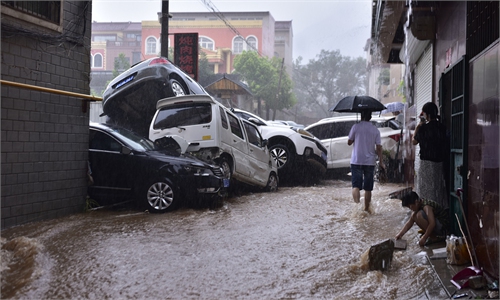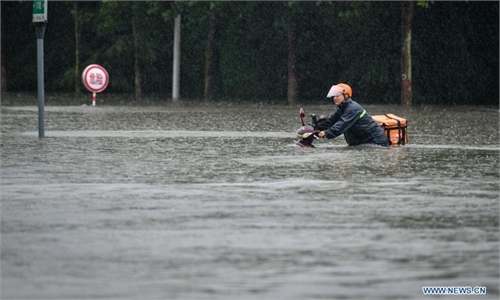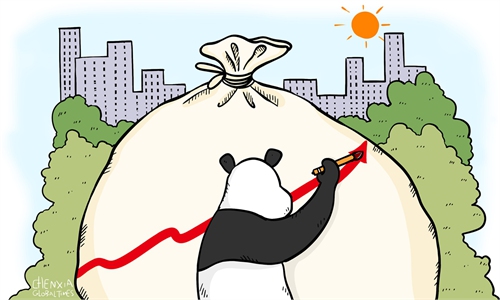COMMENTS / EXPERT ASSESSMENT
Natural disasters and China’s economic resilience

Illustration: Tang Tengfei/GT
The record rainfall and deadly floods over the past several days in Zhengzhou, Central China's Henan Province have triggered China into a crisis management mode. As of Thursday noon, the situation remains dire in Zhengzhou and elsewhere in the province, where 33 are dead, eight are missing and over 3 million are affected.
Rescue and relief efforts remain underway. As the country shown during its response to the COVID-19 epidemic not long ago, the response to the new natural disaster is swift, robust and closely coordinated. Above all, the epitome of China's response to natural disasters is the laser focus on saving lives at all cost. That's why China locked down an entire city and basically put the entire country in a virtual standstill to fight the COVID-19 in 2020.
The same swift, life-above-all response is also at play in responding to the deadly flooding in Henan. Shortly after news of the flooding situation in Henan on Tuesday night, China immediately dispatched nearly 2,000 professional rescuers from seven provinces to Zhengzhou with over 18,500 items of equipment. It has dispatched more than 5,700 military personnel to the province.
On Wednesday, the Ministry of Finance set up an emergency fund of 100 million yuan ($15.5 million), including 60 million for the ongoing rescue and relief efforts and 40 million for recovery and repair mission afterward. On Thursday, the National Health Commission said that it has sent a working team to Henan to provide medical support for the rescue mission and has asked medical response teams in six provinces to be ready for emergency missions to Henan.
While the mission to save lives remains a challenging one given the continued severe weather conditions, the swiftness and robustness of the response is very clear. All eyes are on how such a response could save as many lives as possible and minimize the damage as much as possible. The final result remains to be seen, but the Chinese society also remains profoundly confident as shown in countless voices of support for Henan as well as support for the rescue teams.
How China can mobilize such swift and robust response to natural disasters and can actually put human lives above everything else? Why does the country have the confidence and strength for such massive and costly missions?
There have been much analysis and discussion on this topic. Many have rightly pointed to the advantages of China's highly efficient governance system over that of the often-chaotic governance of some Western countries like the US. But apart from the institutional strength, China's boldness and decisiveness in responding to natural disasters is also draw from the sustained strength and resilience of the Chinese economy.
The COVID-19 pandemic has showcased China's economic resilience, with the Chinese economy becoming the first major economy to return to growth in 2020 and growing at rapid rate of 12.7 percent in the first half of the year, while much of the world remains on an extremely unsteady path to recovery.
Such proven resilience of the Chinese economy offers direct support not only for the country to take all necessary measures to save lives during natural disasters but also the recovery after the natural disasters.
How does that make a difference?
In the US, almost all meaningful and necessary measures to fight the COVID-19, including lockdowns or certain restrictions and emergency funds, were met with great difficulty because of worries over the costs, economic or otherwise. The result is very devastating: over 600,000 deaths, while a long list of economic challenges remain, including new ones such as inflation.
In China, while the cost is no doubt massive, the response was much more effective. There is no comparison in the number of deaths, but there should also be no doubt that the Chinese economy is at a much better position. China's economic recovery, while robust, is much healthier and was not built on a "flood-like" cash injection; the US economic recovery, while there is an expectation of rapid growth, is based on excessive money-printing that has sparks fears of inflation.
In a so-called COVID resilience ranking that has drawn much mockery in China, Bloomberg placed the US on the No.1 spot, while the Chinese mainland was ranked at No.8. Among other sketchy criterion, the ranking appears to view life-saving measures such as lockdown as negative thing.
Indeed, lockdowns can have serious negative impact on not only the economy but also on people's lives - of those who are able to survive. However, the real resilience should be the ability to cope with and make up such impact after saving lives first.
There may be completely different standards and criteria to judge the resilience of a country, but China's resilience is reflected in the country's ability to mobile a massive response efforts to natural disasters, the ability to save lives at all costs, as well as the ability to recovery steadily afterward.
That resilience is why many are confident that the country will do its best in response to the deadly flooding in Henan.
The author is the deputy director of the Business News Center at the Global Times. bizopinion@globaltimes.com.cn




